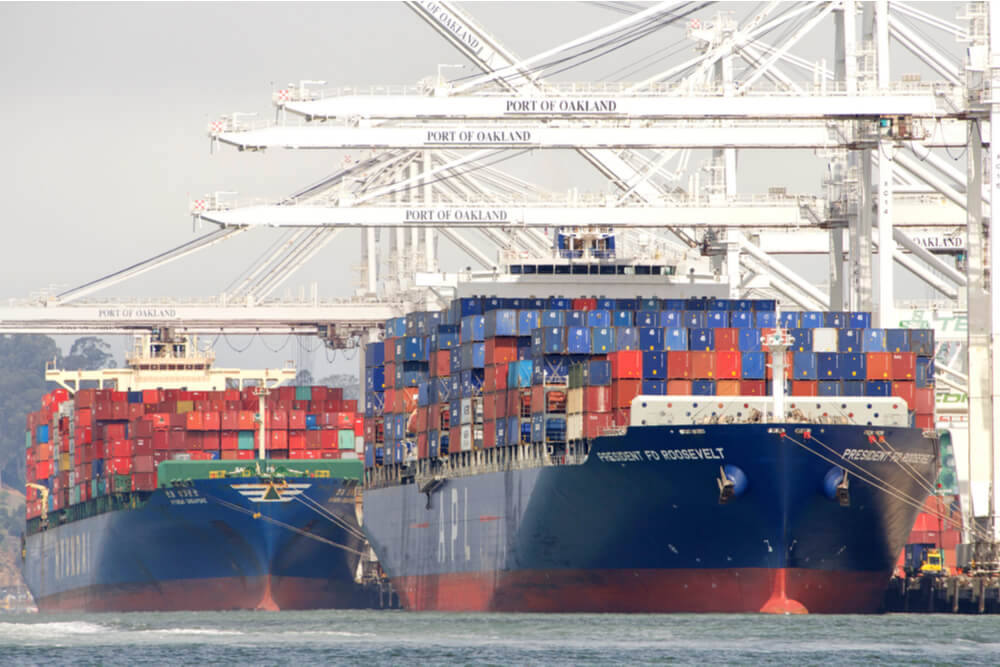
Independent truckers temporarily shut down the Port of Oakland in protest of California’s AB5 law that effectively bans self-employment for many gig-workers. The latest supply chain disruption only confirms shippers’ fears that West Coast ports are unreliable.
“Every day, ILWU workers are getting up at 5 am to drive to the dispatch hall and fill jobs at the port,” International Longshore and Warehouse Union Local 10 President Farless Dailey III reportedly said. ”But when they get to the terminals, the trucker protests are creating conditions which make it unsafe for workers to pass through the gates and do our jobs.”
The owner-operator protests come on the heels of 2021 supply chain logjams that exposed the fragility of the ports of Oakland, Long Beach, and Los Angeles. Even as truckers stifled the flow of goods by blocking entrances, dockworkers and longshoremen are embroiled in strenuous contract negotiations. A strike would impact 29 Pacific Seaboard ports, potentially leaving cargo vessels idling at sea. According to recent container movement data, it appears importers are already pivoting away from the Golden State.
The Georgia Ports Authority recently reported that Savannah set a fiscal-year record by handling upwards of 5.8 million containers as of June 30. That figure represents an 8 percent year-over-year increase and the first time the Port of Savannah surpassed 5 million.
Ranked the country’s fourth-busiest port, the Port of Savannah completed a $973 million channel deepening project in March expected to improve its efficiency. As many as 40 vessels have been spotted offshore patiently waiting to offload.
“The demand we are seeing is completely unprecedented. We are seeing more ships and bigger ships. And the ships are full,” Georgia Ports Authority executive director Griff Lynch reportedly said. “A lot of the cargo has been diverted to the East Coast, and not just Savannah.”
Ports in South Carolina, Virginia, and New York-New Jersey are all experiencing banner years as well. The increase in container traffic has also been felt at Gulf Coast ports. The Port of Corpus Christi recently posted its best quarter in 100 years.
“The Port of Corpus Christi continues to break records and reach new heights due to its laser focus on developing the requisite maritime infrastructure to accommodate the growing demand for American energy commodities,” Port of Corpus Christi CEO Sean Strawbridge reportedly said. “As the Corpus Christi Ship Channel Improvement Project moves closer to completion, the Port of Corpus Christi and its customers stand ready to meet the energy needs of our trading partners and allies around the world.”
During the second quarter of 2022, the port handled 46.4 million tons of goods and materials. That figure eclipses the Texas port’s previous record by 4.8 percent. And during the first half of the year, the port moved 90.1 million tons to establish its most productive six months with an 11.9 percent increase over 2021. Crude oil, liquefied natural gas, and dry bulk cargo were the primary drivers. The Army Corps of Engineers plans to finish the Corpus Christi Ship Channel Improvement Project in March 2023, reportedly making the channel the deepest among the U.S. ports in the Gulf of Mexico.
Sources:











As rich as our nation is, 82 percent of cargo ships should be able to be turned away. However our dc community, have currently and in the past made laws and regulations hurting our manufacturing community. If to start shutting all ports down and send all non American drivers and workers back to there country. If they like this country, let them work together and make there country like ours, and stop with our leaders investing in other countries and stop distorting the other countries chance at democracy.